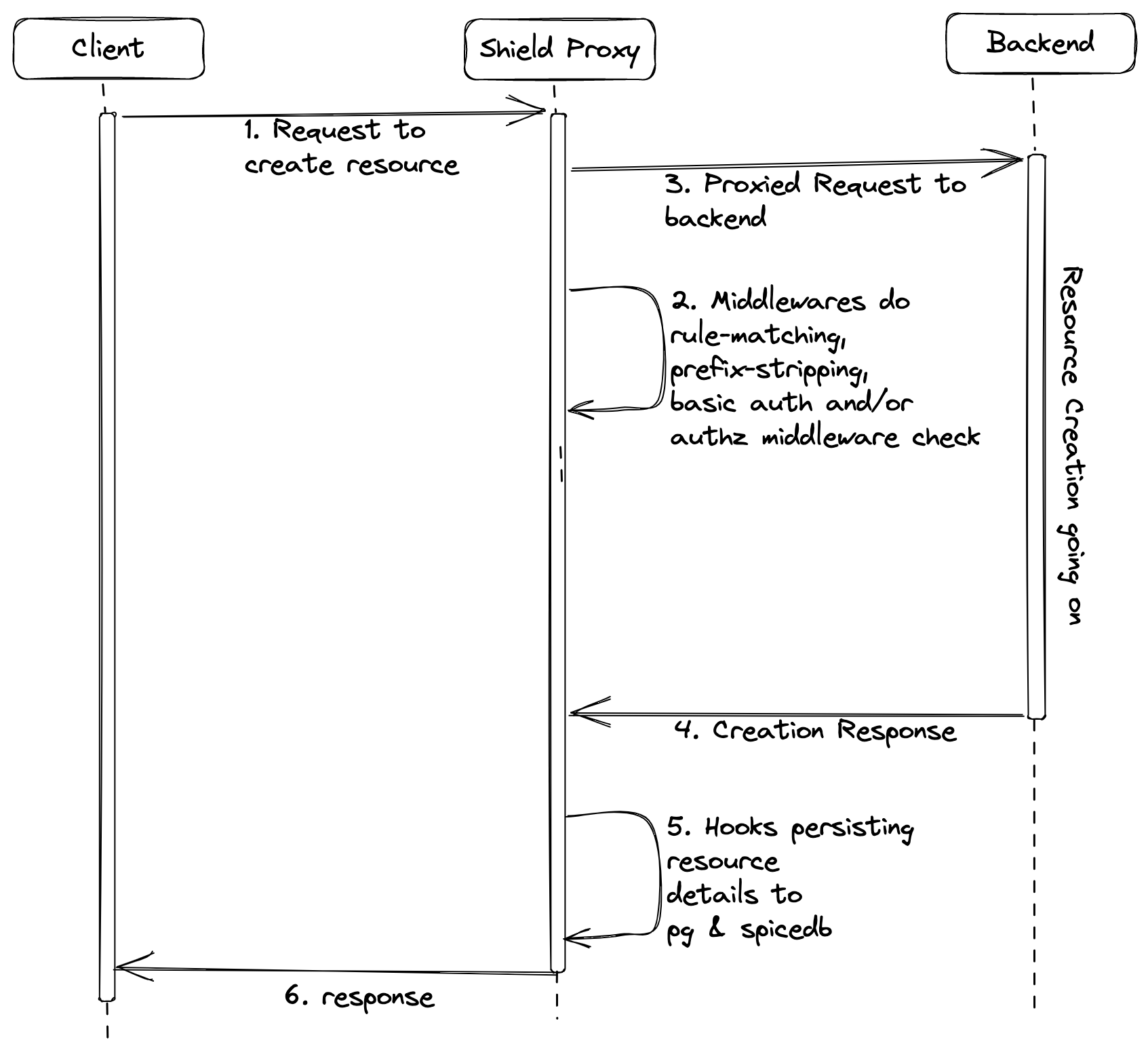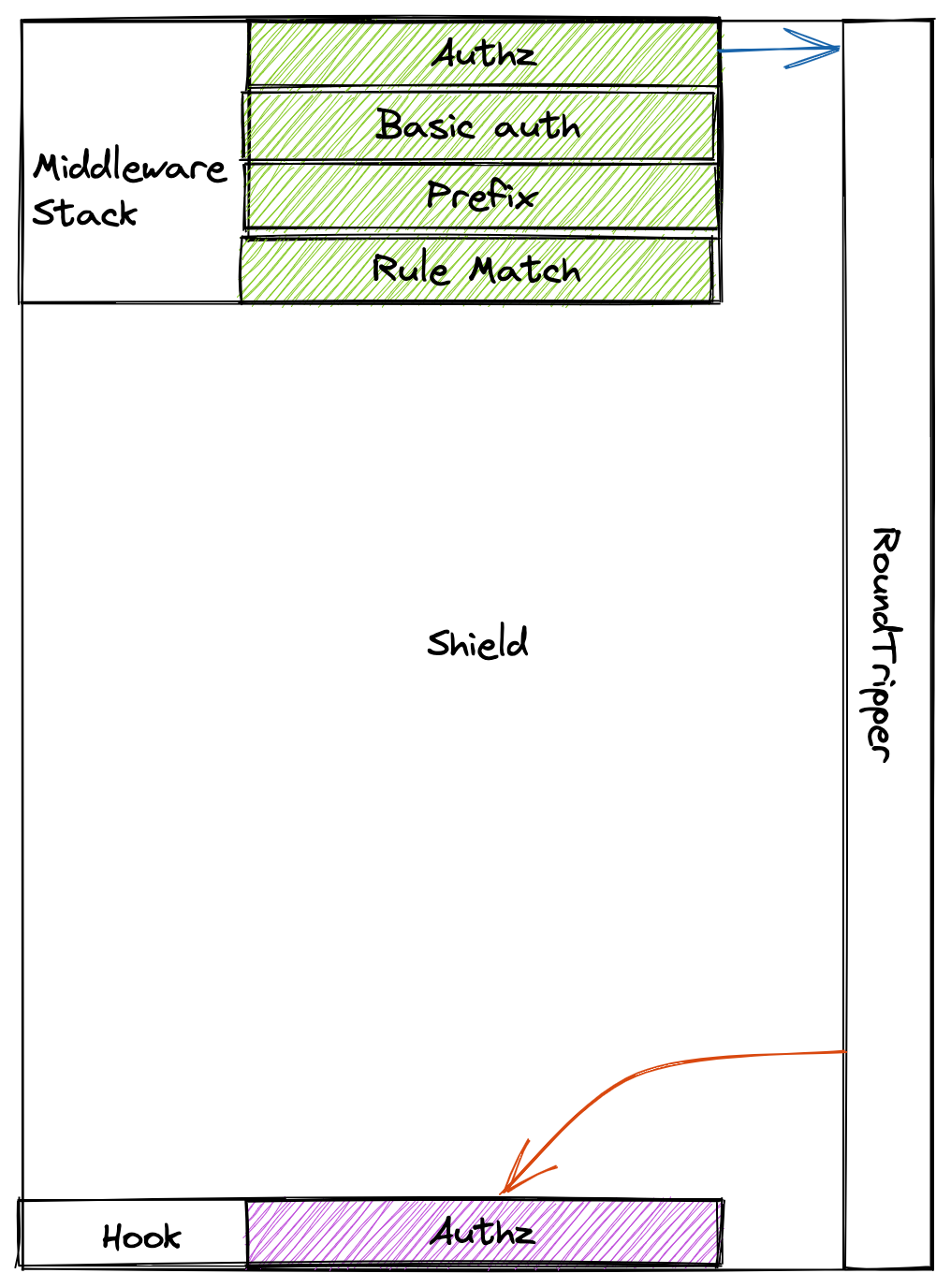Architecture
Frontier is a cloud-native role-based authorization-aware reverse-proxy service that helps you manage the authorization of given resources. In uses SpiceDB authorization engine, which is an open source fine-grained permissions database inspired by Google Zanzibar.
Frontier can be used as a reverse-proxy, intercepting the request between a client and the backend. It offers configurable authorization on each url path. This is handled by authz middleware. This is a non-mandatory step, and can be left unprotected as well.
A Resource Creation Hook comes handy when a resource needs to be created or updated in the backed. Frontier keeps a record or the resource within it's database in order to check authorization later. The resource creation/updation request goes to the backend and when a successful response is received, the hook creates an instance of it in the database.
We can also configure role assignments to certian user or group on this resource as well during the resource creation.
We will talk more with example about the rule configuration in detail, in the guides. Frontier exposes both HTTP and gRPC APIs to manage data. It also proxy APIs to other services. Frontier talks to SpiceDB instance to check for authorization.
Tools and Technologies
Frontier is developed with
- Golang - Programming language
- Docker - container engine to start postgres and cortex to aid development
- Postgres - a relational database
- SpiceDB - SpiceDB is an open source database system for managing security-critical application permissions.
Components
API Server
Frontier server exposes both HTTP and gRPC APIs (via GRPC gateway) to manage users, groups, policies, etc. It also runs a proxy server on different port.
PostgresDB
There are 2 PostgresDB instances. One instance is required for Frontier to store all the business logic like user detail, team detail, User's role in the team, etc.
Another DB instance is for SpiceDB to store all the data needed for authorization.
SpiceDB
Frontier push all the policies and relationships data to SpiceDB. All this data is needed to make the authorization decision. Frontier connects to SpiceDB instance via gRPC.
Overall System Architecture - Frontier as an Authorization Service
Frontier can be used as an authorization service using the check API. Currently, we just allow to check permisison over a single resource, i.e.
can a USER do an ACTION on this RESOURCE.

The API gives a boolean response. You can refer this guide for usage information.
Overall System Architecture - Frontier as a Proxy

The above diagram shows the system architecture which uses frontier as a proxy.
Let's have a look at the major events:
Middleware: Middlewares as their names suggest are engaged befor the request is proxied. There are a few different middlewares which are
rule-matching,prefix,basic_auth,attributeandauthz. We'll discuss each one in details in the upcoming sections.Hook: Hooks are engaged after a response is received form the backend service. Currently we just have a single resource creation hook named
authz.
Let's have a look at the Frontier's Architecture where we will also be discussing about the different middlewares and hoooks.
Frontier Proxy Architecture

Sheild's proxy is build from two major components which are middlewares and hooks. Let's dive deeper into each of these components.
Middleware
Middlewares in frontier have the following interface.
type Middleware interface {
Info() *MiddlewareInfo
ServeHTTP(rw http.ResponseWriter, req *http.Request)
}
type MiddlewareInfo struct {
Name string
Description string
}
Frontier is designed to execute the middlewares in a fixed order maintained by a stack. The order followed is
- Rule match
- Attributes
- Basic auth
- Authz
- Prefix
Rule match
The rule match middleware finds the rule configured for a path and enriches the ctx with it. It also enriched the ctx with the request body.
Attributes
The attributes middleware builds a map of the attributes passed and enriches the ctx with it.
Basic auth
This middleware can be configured to support basic authentication with frontier.
Authz
This middleware checks in the SpiceDB if the user is authorized with atleast one (OR operation) the permissions.
Prefix
This middleware strips a configured prefix from the request's URL path.
Hook
Hooks in frontier have the following interface.
type Service interface {
Info() Info
ServeHook(res *http.Response, err error) (*http.Response, error)
}
Frontier only have a single hook
- Authz
Authz
Authz hook persists the resource been created in the configfured backencd in Frontier's DB. It does not create any relation by default but relations can be configured too. The relashions are created and stored both in Frontier's DB and SpiceDB.